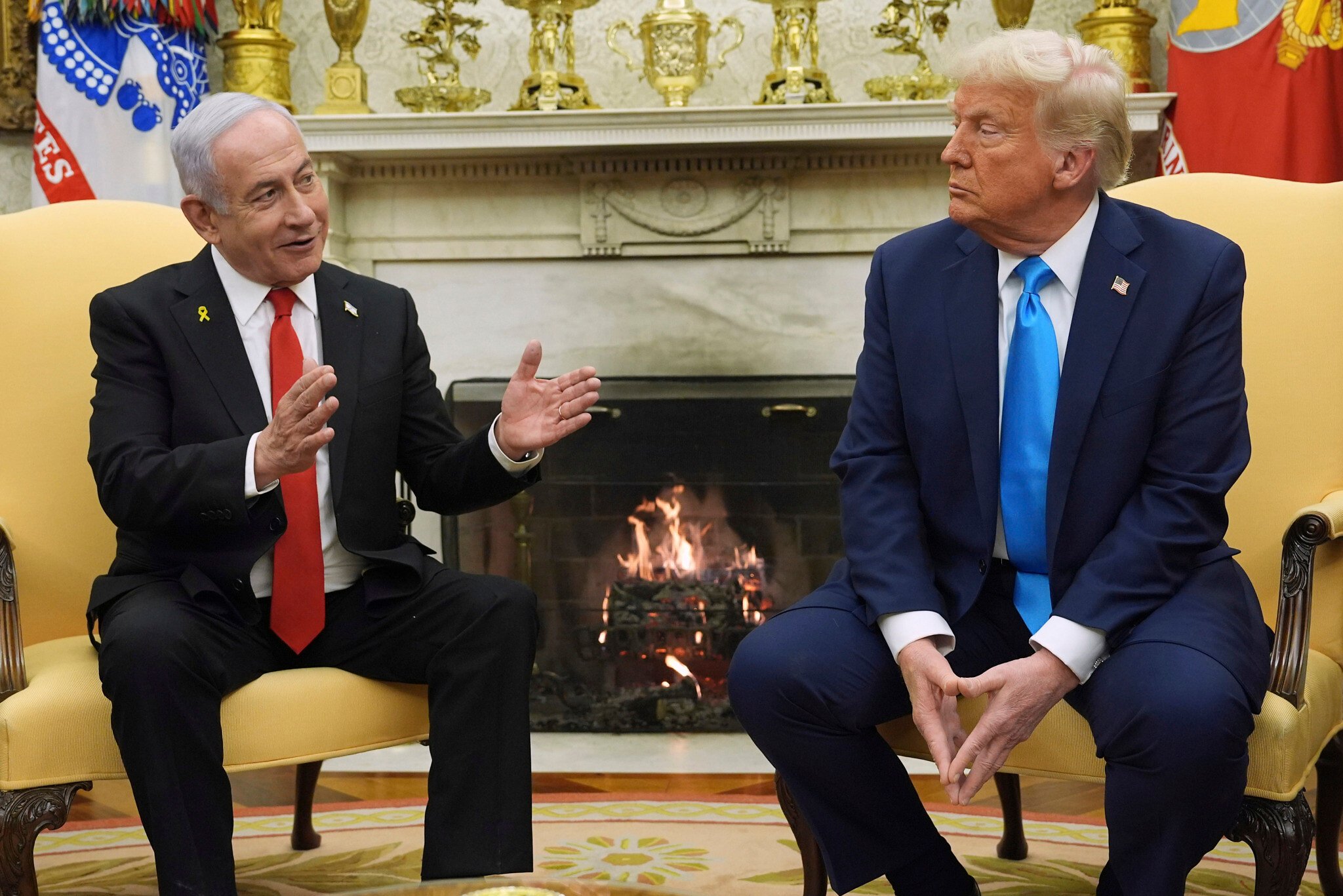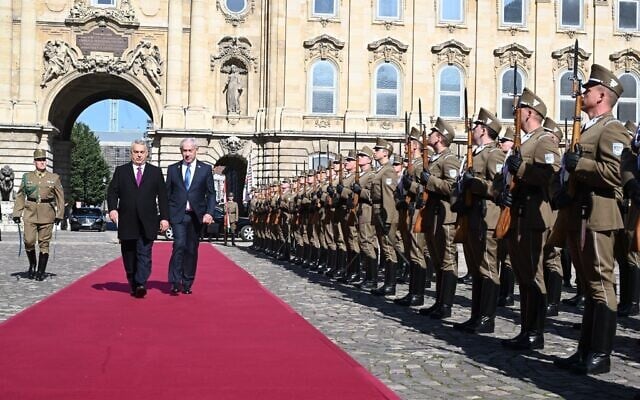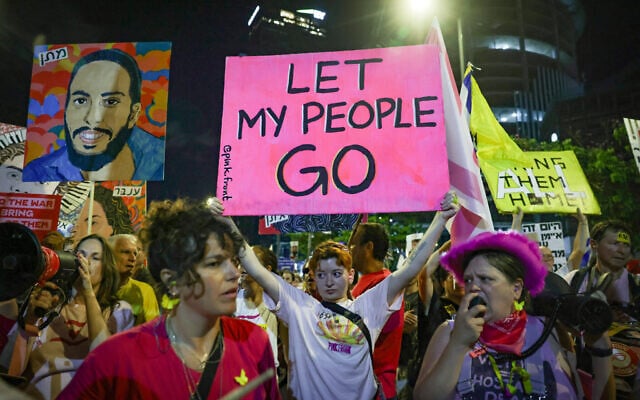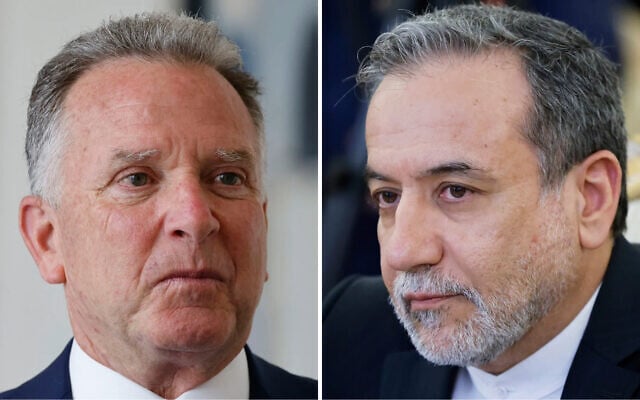



Prime Minister Benjamin Netanyahu is headed to Washington for his third meeting with US President Donald Trump since the latter’s return to the White House in January.
Netanyahu is sure to crow about his repeat invitations by the world’s most powerful man, a tempestuous leader who is known for eventually — even inevitably — turning against his closest confidants and allies.
The prime minister has reason to gloat. His ability to keep Trump onside is an impressive political feat. Isolationists and right-wingers hostile to Israel make up a key demographic in Trump’s coalition, and they voted for a president they expect to end Middle Eastern wars, or at the very least to stay out of them.
In spite of their wishes, Israel hasn’t been forced to end the war in Gaza, continues to blast away in Lebanon, and coordinated tightly with the US on a risky attack on the Islamic Republic while Iranian negotiators were engaged in talks with the administration.
To top it off, Trump ordered a US strike on Iran’s key nuclear facilities, in an unprecedented show of military cooperation between Jerusalem and Washington.
At the same time, Netanyahu knows this visit will be more than a post-Iran victory lap.

His last trip to Washington in April was supposed to be a cakewalk. He had just wrapped up a leisurely trip to Hungary, where he was feted with a mounted honor guard and sailed up and down the Danube. Hungarian Prime Minister Viktor Orban pulled out of the International Criminal Court during his visit, and participated in a three-way call with Netanyahu and Trump that was supposed to mark the creation of a Western anti-liberal alliance.
While in Budapest, Netanyahu accepted a last-minute summons to the White House, expecting to be the first leader to negotiate his way out of Trump’s tariffs. Instead, he walked into an ambush. With the Israeli leader sitting uncomfortably to his right, Trump announced nuclear talks with Iran, gushed over Turkey’s Recep Tayyip Erdogan, and did not cancel tariffs on Israel.
This week’s visit comes with potential for similar scenes.
There is no telling what Trump will do this week on Gaza, amid persistent reports of a possible breakthrough in talks on a ceasefire-hostage release deal.
Despite the optimism, neither Hamas nor Israel have changed their core positions. The terror group will only release hostages if it is convinced it is putting Israel on a road to ending the war from which it will not be able to exit.

Israel, meanwhile, seems to again be banking on a return to combat after more hostages are released.
Netanyahu has been saying as much openly and consistently. “I am telling you, there will be no Hamas,” he said last week during a visit to Ashkelon. “There will be no Hamastan. We are not going back to that. It is over. We will release all our hostages.”
“We will eliminate them to the end,” he said, insisting that releasing the hostages and defeating Hamas go hand in hand.
It is entirely conceivable that Trump sees Israel’s apparent insistence on continuing the war until Hamas is defeated as the primary obstacle to his larger aims in the region, many of which Netanyahu shares: Saudi-Israel normalization and an expanded American alliance in the Middle East.
And he could well tell Netanyahu as much in front of cameras.
Then the prime minister would be caught between contradicting Trump in his own house, and accepting a course that would allow Hamas to claim victory and could well lead to the right-wing flank of his coalition bolting.

The two leaders don’t necessarily see eye to eye on Syria either. Trump is eager to expand the Abraham Accords, or at least show that he is able to broker another meaningful agreement. Though there is also optimism around an Israel-Syria deal, it doesn’t seem especially likely. The new regime in Damascus wants a narrow security deal that would see Israel return to the 1974 lines.
Without progress toward a normalization deal, Israel has little reason to accept a security deal. Syria isn’t attacking Israel anyway, and withdrawal would increase the risk to Golan Heights communities from terror groups in Syria.
Eager for a diplomatic win that has so far eluded him in Ukraine and Gaza, Trump could lean on Netanyahu here as well.
The two leaders will also discuss what comes next on Iran’s nuclear program. They are coming off a tactically spectacular operation, one that also likely achieved its strategic goals of setting back Tehran’s nuclear and ballistic missile program several years.
But it is not clear what comes next.

It looks like negotiations are back on track. White House special envoy Steve Witkoff and Iran’s Foreign Minister Abbas Araghchi are reportedly set to resume nuclear talks in Oslo this week.
This isn’t necessarily a reason for alarm in Jerusalem. Israel would welcome a deal that takes advantage of Iran’s compromised position and locks in the achievements of Operation Rising Lion.
Trump put a lot of political capitol on the line for Israel, and could expect Netanyahu to pay him back in kind.
But Iran has put on a defiant mien, and might calculate that Trump’s forcing of Israel to call off a major attack in the first hours of the ceasefire is an indication that the US president doesn’t want to see any more Israeli strikes.
Trump put a lot of political capital on the line for Israel, and could expect Netanyahu to pay him back in kind.
If the two leaders follow up their successful cooperation on Iran with a common vision for the region, Netanyahu’s meeting with Trump could lay the ground for a much-improved reality in the region. It could turn the military achievements of the 12-day war against Iran into diplomatic gains backed by agreements and the UN Security Council. The two veteran leaders could permanently break Iran’s Middle Eastern axis and open the door for an expanded pro-American network with Israel as a cornerstone.
Yet “if” remains the operative term here.
Netanyahu may be seeking to woo the politically weak Benny Gantz into his coalition, or he may have plans to call snap elections (as his very belated visit to Kibbutz Nir Oz on Thursday may have indicated). Otherwise, however, the prime minister remains bound to those in his coalition who care more for asserting Jewish dominance over Palestinians than creating historic partnerships with Arab states.
And, of course, Trump remains Trump.
